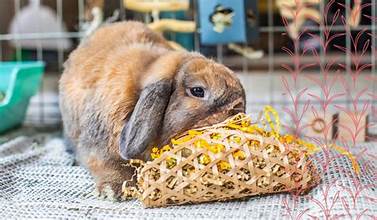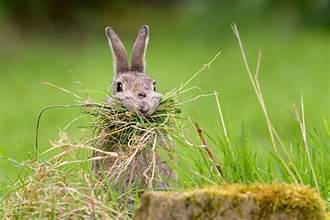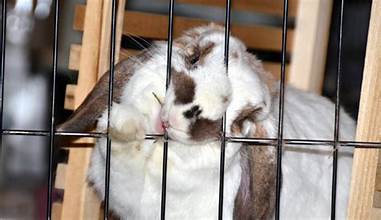Rabbits are naturally curious and playful creatures, and chewing is vital to their well-being. However, their chewing habits can sometimes lead to destruction in our homes. Understanding why rabbits chew and implementing effective strategies can help you protect your belongings while keeping your furry friend happy and healthy.
Why Do Rabbits Chew?
Chewing is an instinctive behavior for rabbits, driven by several factors:
- Dental health:
Rabbits’ teeth continuously grow, and chewing helps wear them down, preventing dental problems.

- Enrichment and stimulation:
Chewing can provide mental stimulation and help rabbits relieve boredom.
- Exploration:
Rabbits explore their environment using their senses, including taste and touch, which often involve chewing.
- Instinct:
Chewing is a natural behavior for rabbits; providing them with appropriate outlets for this instinct is crucial.
Providing Appropriate Chew Toys
Providing your rabbit with safe and engaging chew toys is crucial for redirecting their chewing behavior. Here are some excellent options:
- Hay:
It is a staple in a rabbit’s diet. It provides essential fiber for digestion and is a natural chew toy that keeps rabbit teeth healthy.

- Untreated wood:
Apple sticks, willow branches, and other untreated wood pieces are safe for rabbits to chew on.
- Cardboard:
Cardboard boxes, tubes, and other untreated cardboard items can be repurposed as chew toys.
Plain, unbleached paper, such as newspaper or paper bags, can be used for chewing and shredding.
- Commercial chew toys: Pet stores offer a variety of rabbit-safe chew toys made from natural materials like wood, sisal, and seagrass.
Important Note:
Avoid giving your rabbit chew toys made from plastic, treated wood, or anything with small parts that could be ingested.
Rabbit-Proofing Your Home
Rabbit-proofing your home is not just a suggestion; it’s an essential step to protect your belongings and ensure your rabbit’s safety. Here are some key steps:
- Hide or cover electrical cords:
Rabbits are drawn to electrical cords, so keeping them out of reach or covering them with cord protectors is crucial.
- Protect furniture:
Cover furniture legs with protective guards or use bitter apple spray to deter chewing.
- Secure loose items:
Keep loose items like rugs, curtains, and tablecloths out of reach or secure them to prevent chewing.
- Block access to hazardous areas:
Block access to areas that could be dangerous, such as balconies, stairs, and spaces behind appliances.
- Supervise your rabbit:
When your rabbit is out of its enclosure, always supervise it to prevent accidents and redirect chewing behavior.
Additional Tips
- Provide a stimulating environment:
Rabbits need mental and physical stimulation to stay happy and healthy. Please provide them with toys, tunnels, and opportunities for exploration.
- Spay or neuter your rabbit:
Spaying or neutering can help reduce chewing behavior, especially in females.
- Train your rabbit:
Use positive reinforcement techniques to train your rabbit to chew on appropriate items.
- Be patient and consistent:
Changing a rabbit’s chewing habits takes time and patience. Be consistent with your efforts and provide plenty of positive reinforcement.
Conclusion
Chewing is a natural behavior for rabbits, but it doesn’t have to lead to destruction in your home. By providing appropriate chew toys, rabbit-proofing your home, and implementing the tips mentioned above, you can create a safe and stimulating home for your furry friend while protecting your belongings. Remember, patience and consistency are key to success.





Pingback: The Best Companion For Seniors: Why Rabbits Are Perfect? - Positvley Pets